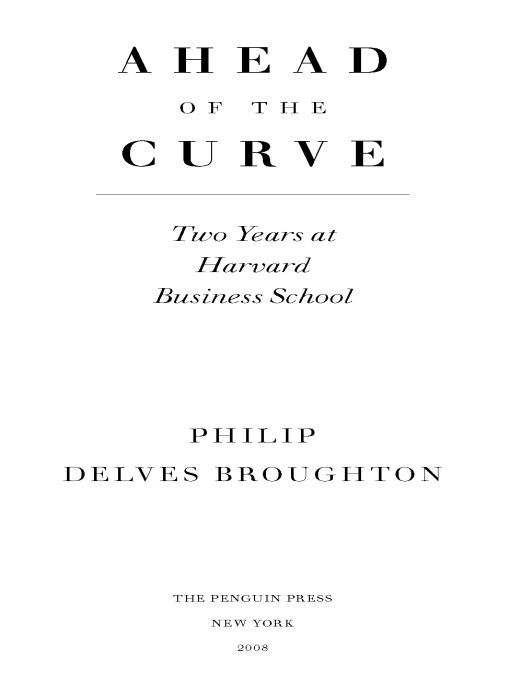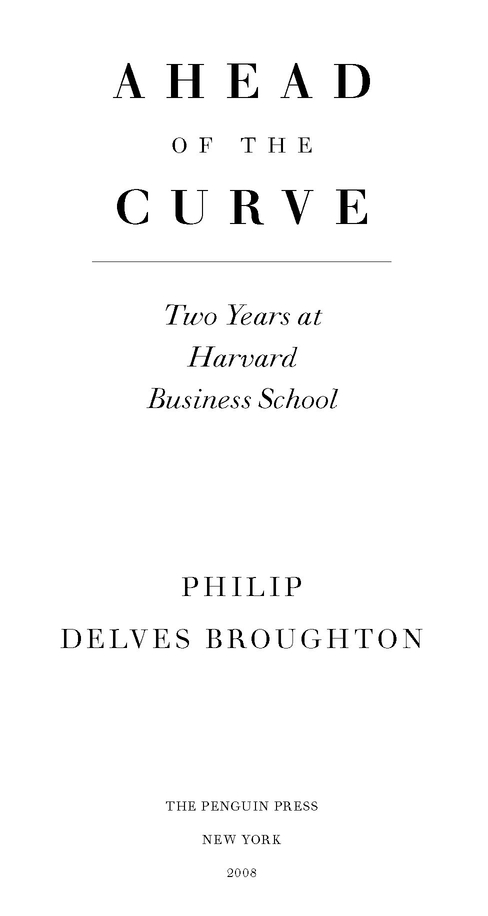Ahead of the Curve
Read Ahead of the Curve Online
Authors: Philip Delves Broughton


Table of Contents

THE PENGUIN PRESS
Published by the Penguin Group
Published by the Penguin Group
Penguin Group (USA) Inc., 375 Hudson Street, New York, New York 10014, U.S.A. Penguin Group (Canada), 90 Eglinton Avenue East, Suite 700, Toronto, Ontario, Canada M4P 2Y3 (a division of Pearson Penguin Canada Inc.) Penguin Books Ltd, 80 Strand, London WC2R 0RL, England • Penguin Ireland, 25 St. Stephen’s Green, Dublin 2, Ireland (a division of Penguin Books Ltd) Penguin Books Australia Ltd, 250 Camberwell Road, Camberwell, Victoria 3124, Australia (a division of Pearson Australia Group Pty Ltd) • Penguin Books India Pvt Ltd, 11 Community Centre, Panchsheel Park, New Delhi-110 017, India • Penguin Group (NZ), 67 Apollo Drive, Rosedale, North Shore 0632, New Zealand (a division of Pearson New Zealand Ltd) • Penguin Books (South Africa) (Pty) Ltd, 24 Sturdee Avenue, Rosebank, Johannesburg 2196, South Africa
80 Strand, London WC2R 0RL, England
a member of Penguin Group (USA) Inc.
All rights reserved
The curve : two years at Harvard Business School / Philip Delves Broughton
p. cm.
Includes index.
eISBN : 978-1-4406-2962-4
1. Harvard Business School. 2. Business education—Massachusetts. 3. Business students—Massachusetts. 4. Management—Study and teaching (Higher)—Massachusetts. I. Title.
HF1131.H4B76 2008
650.071’.17444—dc22
2007042746
650.071’.17444—dc22
2007042746
10 9 8 7 6 5 4 3 2 1
The scanning, uploading, and distribution of this book via the Internet or via any other means without the permission of the publisher is illegal and punishable by law. Please purchase only authorized electronic editions and do not participate in or encourage electronic piracy of copyrightable materials. Your support of the author’s rights is appreciated.
For Margret
There are two types of education. One should teach us how to make a living and the other how to live.
—JOHN ADAMS
PREFACE
I did not go to Harvard Business School planning to write a book about the experience. In fact, after ten years as a journalist, I went there to recover from writing, to stop looking at the world around me as a source of potential stories. I wanted to learn about business in order to gain control of my own financial fate and, more important, my time. I was tired of living at the end of a cell phone, prey to an employer’s demands. A master’s in business administration, I hoped, would be my path to greater knowledge about the workings of the world and broader choices about the life I might lead.
I say this only to make clear that this book was never intended as an inside raid. In many ways, I loved my two years at Harvard. My classmates were smart and considerate. The faculty was, for the most part, inspiring and committed. The facilities and the speakers who came to spend time with us were quite extraordinary. As a catbird seat for viewing capitalism, there is no better place. For me, and everyone I knew, Harvard changed the view of our futures and the possibilities available to us through business.
But it was an intense time, far more intense than I’d ever imagined. The work load, especially in the first few weeks, was crushing as we struggled to learn the functional areas of business, finance, accounting, operations, marketing, and organizational behavior. As the months passed, the pressure to find jobs, the “right” jobs, became a separate education in itself, beyond what occurred in the classroom.
This book is my attempt to describe my experience and that of my classmates in this cauldron of capitalism. Reading through the diary I kept during my two years there, I was surprised by the emotions the experience drew out of me. I had expected a more neutral time at business school, a period of study and preparation for a different career. Instead, we MBA students spent much of our time discussing our ambitions and the kinds of lives we wanted for ourselves and our families. This debate looms large in the book, alongside accounts of what we learned in class, what the many famous speakers said, and how we went about deciding what to do for work. To have the opportunity to study at Harvard Business School is a great gift. Any gripes, criticisms, or anxieties I express should be taken for what they are: high-class problems.
In 1960, five thousand MBAs graduated from American universities. In 2000, the number had risen to a hundred thousand. The MBA course now comes in all kinds of flavors. There is the classic two-year, full-time residential course, which I took. But you can now study for an MBA part-time, online, at night, or in multiple international locations. Where capitalism goes, the MBA follows. The number of MBA applicants in the Middle East, China, and India is soaring. Survey after survey has shown that MBAs tend to receive higher salaries and better jobs. Those three precious letters have become a calling card, and in some cases a requirement, for success in business.
While I attended Harvard Business School (HBS, as I shall often refer to it), between 2004 and 2006, the school’s alumni included the president of the United States, the secretary of the U.S. Treasury, the president of the World Bank, the mayor of New York City, not to mention the CEOs of General Electric, Goldman Sachs, and Procter and Gamble. HBS alumni filled 20 percent of the top three jobs at the Fortune 500 companies. The newly fashionable private equity and hedge fund industries were stacked with Harvard MBAs, who were received like gods when they returned to campus. It was daunting and thrilling to join such a powerful lineage.
The school believes that the kind of leadership required to succeed in business can also be applied to other spheres—politics, education, health care, the arts. I did not come from a business background and instinctively resisted this notion that businesspeople should be running everything. It was a question that came up repeatedly over the next two years, and it cuts to why a book on the Harvard MBA should be of interest to a broader audience than those who either have an MBA or are considering getting one. The language, practices, and leadership styles taught in the MBA course affect all of us. Business schools no longer produce just business leaders. MBAs determine the lives many of us will lead, the hours we work, the vacations we get, the culture we consume, the health care we receive, and the education provided to our children. Since 2000, the Harvard MBA in the Oval Office has made decisions of global and historical consequence. In short, the MBA, its content, and the network of people who hold it, matter. And it has ambitions to matter even more.
Finally, this book is just one person’s view. No single MBA could ever be representative of the nine hundred students in the Harvard Business School class of 2006. Everything in this book occurred as I describe it. But I have altered the names and changed details to conceal the identities of some of my fellow students. I did this for two reasons. The first was privacy. The Harvard Business School classroom is a safe learning environment, a place to experiment and make mistakes. My classmates did not know that one day I would write a book about our experiences. While my own embarrassments and humiliations fill this book, theirs are their own concern. The second reason for concealing some identities is that it allows me to describe what we went through with greater honesty than if I had to worry about the reputations of people I like and admire. The professors, since their role as teachers is a public one, appear as they were, as do the speakers who came to campus. My intention in combining these approaches is to give as accurate a picture of my time at HBS as possible.
When my class graduated in June 2006, we received an open letter from the dean of the school, Jay Light. “As you join other HBS alumni around the world,” he wrote, “I hope you’ll stay connected to the School and continue to share your thoughts and perspectives on your years here.” Here are mine.
Chapter One
LET’S GET RETARDED
Well, don’t we all feel like jumping to the end of the world sometimes?
—MICK JAGGER
The dean of Harvard Business School and ninety of my classmates were looking straight toward me. At that very moment, I was trying to corral a collapsing chicken salad sandwich and looking very “just Philip” indeed. We were a few weeks into the MBA course, and Dean Kim Clark had come to our classroom this lunchtime to introduce himself and take questions. He was a gaunt, devout Mormon in his late fifties who spoke with the authority of the prophets, quiet but commanding.
“When I first came into this classroom as a young professor to teach, there was a guy called Jack sitting there. He’s now Jack Brennan, head of Vanguard. Over there was a former Dartmouth football player, Jeff. Jeff Immelt is now the chief executive of General Electric. Over there was Donna, Donna Dubinsky who became the CEO of Palm.”
A switch seemed to have been flipped in our windowless basement classroom. You could feel the hum of ambition. Ninety students in five rows arranged in a horseshoe facing the blackboard, all of them, even the one now licking mayonnaise and chicken off his pencil, thinking: Will I be the one they mention in twenty-five years? Will a future dean address the class of 2031 saying, “In that seat was Susan. She was shy of speaking in class but now she’s running the largest hedge fund in the world. Tom over there became CEO of Google. And Philip. Well. How many billions should one man have?”
We were all looking at each other, wondering.
Other books
Freddy and the Flying Saucer Plans by Walter R. Brooks
Death Plays Poker by Robin Spano
Madcap Miss by Joan Smith
How They Started by David Lester
La amenaza interior by Jude Watson
Trust by Terry Towers
Guilty Minds by Joseph Finder
Red or Dead by David Peace
Steamy Southern Nights by Warren, Nancy